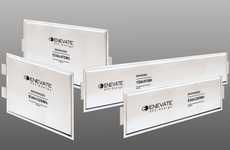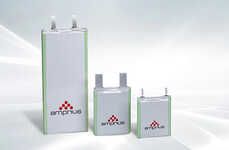
This Sodium-Ion Battery Makes Use Of a Baked Oak Leaf
Rahul Kalvapalle — February 23, 2016 — Tech
References: nanocenter.umd.edu & gizmag
A group of scientists and researchers from the University of Maryland and the National Center for Nanoscience and Technology from Beijing have created a high-tech sodium-ion battery using a decidedly low-tech ingredient -- an oak leaf. The researchers baked the oak leaf before flushing it with sodium, creating a negative battery terminal.
The leaf's natural shape makes it ideal for battery use, thanks to its low surface area and the fact that it includes a lot of tightly packed miniature structures. The scientists baked a dry leaf at 1,000 degrees Centigrade for an hour, before immersing it in hydrogen chloride for six hours to get rid of inorganic impurities. The end result is a carbonized leaf whose pores can absorb sodium electrolyte.
This sodium-ion battery is a wonderful invention as it proves that organic materials do indeed have potential to take care of some energy needs.
The leaf's natural shape makes it ideal for battery use, thanks to its low surface area and the fact that it includes a lot of tightly packed miniature structures. The scientists baked a dry leaf at 1,000 degrees Centigrade for an hour, before immersing it in hydrogen chloride for six hours to get rid of inorganic impurities. The end result is a carbonized leaf whose pores can absorb sodium electrolyte.
This sodium-ion battery is a wonderful invention as it proves that organic materials do indeed have potential to take care of some energy needs.
Trend Themes
1. Organic Batteries - The use of organic materials in battery technology presents opportunities for sustainable and eco-friendly energy solutions.
2. Sodium-ion Batteries - The development of efficient and cost-effective sodium-ion batteries could revolutionize the energy storage industry.
3. Carbonized Leaf Batteries - The utilization of natural materials for battery electrodes could lead to advancements in battery technology and more versatile energy storage solutions.
Industry Implications
1. Renewable Energy - The renewable energy industry could benefit from the development of sustainable and eco-friendly batteries using organic materials.
2. Energy Storage - The energy storage industry could be disrupted by the introduction of more efficient and cost-effective sodium-ion batteries.
3. Battery Technology - The battery technology industry could see advancements in the utilization of natural materials for electrodes and the creation of more versatile energy storage solutions.
0.9
Score
Popularity
Activity
Freshness























